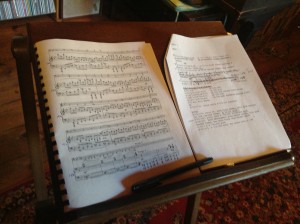 I wandered out to pick the final raspberries of the summer on a gorgeous fall day. Zeke sent me behind his house to blow off some steam. The editing had been getting intense. The sweetness of the berries consumed my attention. They were plump and almost past ripe, dark red, but just right, at least on that day. I intended to fill the Tupperware in my hand to share with Zeke and Alys, but instead I became intoxicated by their flavor and ended up with only a token handful to share. In a way I regretted this token. I wanted every last berry in this patch for myself. Not because I was being selfish but because I wanted to feel completely uninhibited in the pleasure of the moment. It’s only with great self control that I saved any. The idea of compromise and the brilliant blue of the sky brought me back to the task at hand, as the air filled with the sharp clarity of autumn brought on by the cool of evening descending.
I wandered out to pick the final raspberries of the summer on a gorgeous fall day. Zeke sent me behind his house to blow off some steam. The editing had been getting intense. The sweetness of the berries consumed my attention. They were plump and almost past ripe, dark red, but just right, at least on that day. I intended to fill the Tupperware in my hand to share with Zeke and Alys, but instead I became intoxicated by their flavor and ended up with only a token handful to share. In a way I regretted this token. I wanted every last berry in this patch for myself. Not because I was being selfish but because I wanted to feel completely uninhibited in the pleasure of the moment. It’s only with great self control that I saved any. The idea of compromise and the brilliant blue of the sky brought me back to the task at hand, as the air filled with the sharp clarity of autumn brought on by the cool of evening descending.
After seven hours we still had more editing to do. We had reached a moment in our decision over a particular section in Rachmaninoff where the age old question of passion or precision emerged, a choice between a performance with sweep and character, or a slower more careful one with every note speaking exactly. This argument offered me the opportunity to discover my core values, but it also stirred up an ocean of passion. Since we were at an impasse we decided to revisit the question after a dinner break.
Mostly the editing had been going well in terms of team work, but the decisions were not always easy. Since so much is possible these days with technology, it’s hard to know when to draw the line. We can splice in single notes or reconstruct whole passages measure by measure. Since it’s easy to lose the character of the initial performance in the process of editing away things you don’t want, we had spent most of the day hunting for the takes that were mostly good and using them as whole as possible. But as we grew tired, one or the other of us started wonderIng about this slightly swooped note, a scratchy tone, a missed piano bass note, ensemble mishaps and the edits began to increase.
It’s humbling to listen to 15 hours several times over of a your playing and natural to start to get bugged by little imperfections. While it’s true we don’t want to distract our listeners with bloopers, how do we know when we are listening with the microscopic ears of editing that inevitably magnify everything, and when a note is truly out of tune enough to justify possibly breaking up the flow of the passage? Could I have the strength to hear my imperfections set in stone, repeated, reproduced and immortalized?
My mom told me when I was a child that when artists in Islamic countries weave rugs they intentionally leave an error so as not too offend Allah. I always loved this idea. When I was younger it gave me permission to be imperfect. As my values have shifted over the years I hear another message in this story- a reminder that when we offer our art in devotion to something larger than ourselves, whatever God we may serve, we walk away from the conversation all together of perfectionism. As a musician I do always strive for excellence, but It is only when fear of vulnerability or embarrassment or pride, narcissism and a lack of humility take charge that a need for perfection trumps my music making. When this happens the joy disappears and I am in a hungry relentless search for positive self reflection. It’s a dead end.
 As I stood in the raspberry patch that day, I became aware that I had shifted to a new place of comfort and the resulting courage to embrace my strengths and weaknesses. To step forward owning both my light and shadow. And in my heart I promised that I could indeed bear to hear my imperfections set in stone, repeated, reproduced and immortalized if the result would bring joy to people.
As I stood in the raspberry patch that day, I became aware that I had shifted to a new place of comfort and the resulting courage to embrace my strengths and weaknesses. To step forward owning both my light and shadow. And in my heart I promised that I could indeed bear to hear my imperfections set in stone, repeated, reproduced and immortalized if the result would bring joy to people.
I returned inside with my meager harvest of raspberries. Nobody seemed to want them anyway, so I devoured the rest. We took a long dinner break, then returned to our listening. We found the best compromise possible, and several hours later, at last, we finished with our edits. I carried the marked score to my car like precious cargo to be mailed in the morning to our recording engineer. Alys followed me as we wound in the dark down the long Vermont dirt road.














